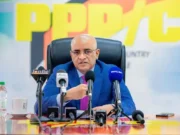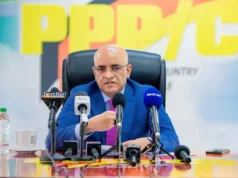Dear Editor,
Allow me this opportunity to bid US Secretary of State, Antony J. Blinken, a very warm welcome. I would also like to share a few points with Secretary Blinken, and this, not least because I can speak from both the Washington and Georgetown side of things.
From the DC angle I spent 25 years at the School of International Service, American University, where I taught international affairs. It is the largest and among the highest-ranked school of International Relations in the world. During that time, I also consulted and/or interacted with the State Department, World Bank, Center for Strategic and International Studies, Council on Foreign Relations, and inter alia, the Carnegie Corporation.
I was Director of Comparative & Regional Studies and served as Interim Director for the Council of the Americas. Professor Robert Pastor (who played a leading role in Guyana via the Cater Center), and I shared a strong professional relationship. Based on the above, I feel comfortable sharing some ideas with Secretary Blinken.
I offer five considerations. Firstly, Mr. Secretary, I would like to take you back to a meeting you had with Jose Cardenal in April 1983. You will recall that Cardenal, having contributed to the removal of Anastasio Somoza, came to Boston with high credibility. Yet, you did not take at face value his charge that the Sandinistas were illegitimate. Here is what you wrote “Some of the “facts” that Cardenal uses–for example, “90-percent of the Nicaraguan people are against the Sandinistas”–are impossible to verify” (Blinken, April 23, 1983). Sir, the quick analytical determination employed then on Cardenal, could be extremely apt and appropriate for Guyana exactly 40 years later.
You may recall that on Cardenal you also wrote – “…he carries a certain authority, a certain legitimacy, simply by virtue of having lived in Nicaragua. It’s hard to debate Cardenal when you’ve never set foot in Central America” (Ibid). Well, Guyana is full of Jose Cardenal type personalities even though they were ones on the wrong side of history.
The very persons who replaced state institutions with “party paramountcy” will come in with heavy doses of narrational flourish, banking on their localness as the source of legitimacy. I feel compelled to request you don the Crimson cap of April 1983. To use that famous expression of President Reagan, “trust but verify.”
Secondly, and if I may get into directly to substantive matters, you will be bombarded with several standardized talking points that have been professionally rehearsed. The most important of these is that the primary problem in this country is racial division. No doubt, many who push this line will prey upon the difficult race relations that obtain in the United States.
There is no comparison between the two cases and the most elementary employment of ideographic or comparative analysis will quickly expose – shall we say the “Cardenal” dimensions of the claim, namely, “impossible to verify.” Note that many foreign experts make the same mistake on race relations here.
Thirdly, in contradistinction to the claim that race is the number one impediment to progress, I have determined that the real issue is that there are still authoritarian social forces in Guyana. What do I mean by this? Simply stated, those social forces from the mid-1960s that backed the capture of state power through rigged elections, combined with coercion and violent intimidation, are still alive and well.
Ask about Mr. Ogunseye’s threats. If I may put it in the words of the Italian theorist Antonio Gramsci Sir, “[t]he crisis consists precisely in the fact that the old is dying and the new cannot be born; in this interregnum a great variety of morbid symptoms appear.”
Well, we don’t quite have a crisis per se, and the symptoms aren’t necessarily “morbid.” What we do have is the stubborn refusal of elements from the People’s National Congress and its coalition to abandon their old ways, and to instead, embrace the resolution of political and policy differences through constructive political engagement.
Fourthly, the ABCE configuration had placed much hope in the AFC when they were cajoled into existence more than a decade ago. They have turned out to be a real disappointment not least because of their transparent attempt to help with election theft in 2020. They now lie prostrate, in the bent heat of ignominy. Yet they have the uncanny proclivity to claim movement towards moral recompense.
Another crucial point for your consideration Secretary Blinken is that the Guyana diaspora is an immense resource for our national development, but a small element of that diaspora breaks American law by long-distance cultivation of conflict, including violent conflict in Guyana. While I have written extensively on migration, sovereignty, and related matters, I am not sure if it is legal for persons in the United States to cultivate violent racial antagonism in a foreign country.
Fifth, and finally, you no doubt know the old adage of political realism – “small states don’t matter.” We respectfully differ, and I feel confident that you do not subscribe to this realpolitik ‘dictat.’ Against those who reduce international affairs to international POLITICS, where small states have no belonging, I suggest that a functioning world order is impossible without a moral compass that unremittingly points to global justice, to the equality of existence, and to the proposition that nous sommes petits mais avons de la dignité. I know you are aware and reject how President Wilson reacted to that most foundational Japanese proposal on world equality at Versailles.
In so many ways it is odd that this country has been discursively reduced to oil and gas. Guyana is in fact a delightful land of immense cultural and natural diversity. People here have struggled against a formidable Maginot Line of economic and political isolation. Through the sheer dint of hard work and unflagging determination, the people of this soil have taken history into their own hands, climbing the ladder of upward social mobility, creating opportunities for themselves and others, both here and abroad.
This is a place that has now found its voice, its step, its mojo. We are enjoined here to do nationally what President George W. Bush said of education in America, namely, to rid ourselves of “the soft bigotry of low expectations.” Your presence here is a moment of that path. Welcome again.
Sincerely
Dr. Randolph Persaud











